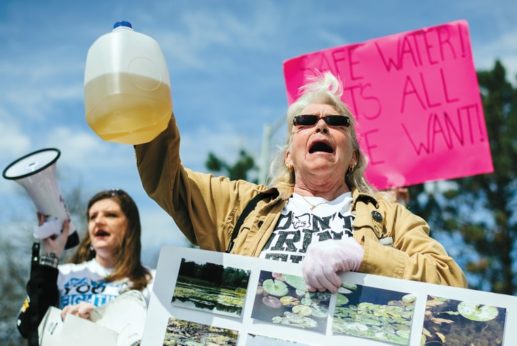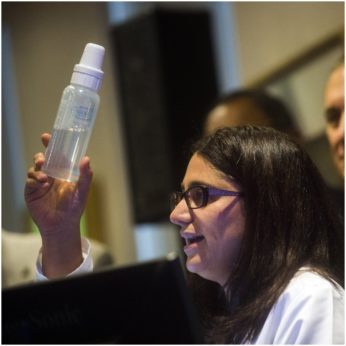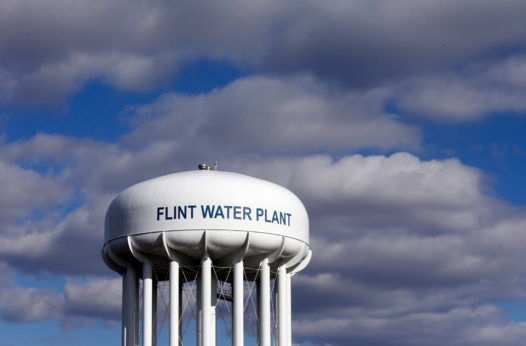
WASHINGTON—Four years after the crisis hit, kids in Flint, Mich., are still afraid to drink the water.
For good reason, adds Dr. Mona Hanna-Attisha, the pediatrician, whistleblower, and – now – union member who revealed the presence of lead in the city’s drinking water.
“To this day, they’re scared,” she told People’s World after speaking to a standing-room-only crowd at the AFL-CIO about her new book on the crisis and its aftermath, What The Eyes Don’t See: A Story Of Crisis, Resistance And Hope In An American City.
“They’re scared of the water. If you turn on the tap, they don’t want it,” she added.
That’s because the kids and their parents fear there are still traces of lead in the city’s drinking water, even as Flint becomes the first city in the country to have a completely new municipal water system.
But it’s not just water. Hanna-Attisha calls the poisoning of Flint’s kids “environmental racism,” and also typical of what minority and other sidelined communities, like Flint, suffer nationwide, not just in old infrastructure but other areas as well, and all in the name of budget-cutting and, often, corporate profits.

A pediatrician and public health specialist, Hanna-Attisha, with the help of a federal Environmental Protection Agency staffer who also was concerned, discovered and publicized the high concentrations of lead in the majority-minority city’s drinking water.
Lead causes brain damage and other disabilities and studies show, she told the crowd, that no level of lead exposure is safe in drinking water, paint or anything else. Studies show “the acceptable lead level for drinking water is zero.”
But a financial czar, appointed by white GOP Gov. Rick Snyder to take over the financially ailing majority-minority city, ordered the switch in water sources from the clean Great Lakes – where Flint had drawn its water for 100 years – to the polluted Flint River, and without spending the small sum needed on specific chemicals to prevent lead from Flint’s old water pipes from leaching into the water.
Yet the state knew something was wrong: It told its own officials in Flint to buy bottled water, and it didn’t protest when GM switched water sources back to the lakes because Flint River water “was corroding engine parts” in the city that was the one-time seat of the car company. Meanwhile, it told Flint parents everything was OK, she said, even as lead invaded their kids’ bodies and brains.
The result was a disaster, and one Hanna-Attisha said could easily be duplicated in other cities, given their elderly water pipes. Indeed, she asked the crowd how many lived in Washington, D.C., itself – and reminded those who raised their hands they went through their own, longer, water crisis a decade ago. And nobody was punished, indicted, or sacked as a result. There have been indictments in Michigan.

But it’s more than just water, Hanna-Attisha and moderator Rep. Dan Kildee, D-Mich., who represents Flint, told the crowd. “This is about a city that’s been left behind and a complete lack of care” by the state government, the congressman said.
“That’s why I wrote this book,” said Hanna-Attisha. “It’s about democracy, racism” and exploitation of the most-vulnerable people. “We have this Financial Management Law and the state could just swoop down and take over” a city or other government, leaving its officials powerless and its citizens with no say.
That’s what Michigan has done, and in every case, it’s the majority-white, GOP-run state government swooping down and seizing control of a majority-minority government, including Flint, Detroit, Detroit’s schools and Grand Rapids, she noted.
The basic conditions in Flint, and elsewhere, were left unchanged in the takeover, Hanna-Attisha said. That includes the highest poverty rate in the state. “Your future shouldn’t depend on what zip code you were born in,” commented Hanna-Attisha, who proudly said she’s now a National Writers Union member. That union is an Auto Workers sector.
State officials also didn’t listen to the mothers who started to complain about water that was “green and brown and smelled funny and tastes weird.” The mothers, like their kids, were minority-group members. “The first rule for a pediatrician is ‘Always listen to the mother,’” Hanna-Attisha said.
But there’s a hopeful side of the book and the Flint water crisis, too, said Hanna-Attisha: That of citizens rising up, educating themselves, empowering themselves and forcing the powers-that-be to act. And they’ve stayed active: There’s now a commission oversees the complete overhaul of Flint’s water system, and it includes both parents and kids.

That’s part of the American Dream, she says.
Another part is you don’t have to be born here. Hanna-Attisha pointed out she came to the U.S., at age 4, with her parents. A naturalized citizen, she was born in the United Kingdom after they fled Iraqi dictator Saddam Hussein, as political refugees. She “gives thanks for” waking up every day in the U.S. amid its freedoms. And she notes many other migrants – including those seeking asylum at the U.S.-Mexico border – have the same dream.
And union members are part of the dream, she told the crowd, adding she was extremely happy to discuss the book at the AFL-CIO. Hanna-Attisha rattled off a long list of unions – the Plumbers, the Auto Workers, the Teachers, the NEA “and so many more” – who pitched in to help. “We’ve never felt alone since, because the labor movement has had our back,” she concluded.
The book is available from its publisher, Random House, from unionized booksellers or on Amazon.










